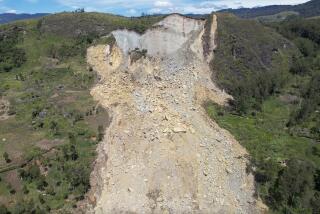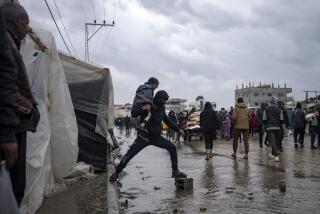Aid Elusive for Quake Victims
KASIHAN, Indonesia — International aid poured into central Java on Tuesday, intended for victims of the earthquake that left as many as 200,000 homeless.
But even as U.S. Marines landed at a nearby airport and the American amphibious assault ship Essex headed toward the island, few signs of the outside world’s concern were evident in many of the villages hardest hit.
In this shattered village four miles from the headquarters of the relief effort, survivors of Saturday’s magnitude 6.3 quake said Tuesday that they had received more supplies from people driving past than from any organized assistance. Just obtaining a plastic sheet from the Red Cross for use as a shelter was a bureaucratic ordeal that took all day, they said.
“We asked for food, but we were told we had to get approval from the head of the village,” explained Purwanto Raharjo, 45, who lost her home in the quake. “But the head of the village made it difficult for us to get his signature, and so we had to wait. And by the time we got his signature, the food was already distributed to other people.
“It’s very complicated,” she added. “So we just try to find food and other things we need by ourselves instead of asking the officials to give them to us.”
Officials said shoddy construction using bricks without mortar contributed to the collapse of thousands of houses occupied mainly by the poor, driving the death toll to an estimated 5,700.
Survivors have set up temporary shelters in rice fields and by roadsides. In many villages, young men and boys stand in the middle of the street begging passing motorists for food and money. Some have become aggressive, blocking traffic in the hope of receiving donations.
At the same time, the coordination of volunteer efforts has been so haphazard that some specialists have nothing to do.
Take, for example, the 25-member rescue crew from Taiwan, with two doctors and three nurses, accompanied by a sniffer dog. The crew members were asked to come to the region by a relative of the sultan of Yogyakarta, an ancient city near the epicenter. But Tuesday, they had no assignment. Left to their own devices, they decided to follow a local news crew to a village that was said to need assistance.
“Our only problem is we don’t know the place and we need people to lead us,” said Michael Chu Jen-ho, the team’s chief.
It doesn’t help that the relief effort is using two different radio frequencies, and many of those involved cannot even talk to one another, said Denny Yudawan, the coordinator of an Indonesian search-and-rescue unit.
“So far, there has been no clear coordination,” he said. “When volunteers come ... to help, they are supposed to be directed to areas that haven’t been reached yet. But that’s not happening now. They find those areas themselves.”
Here in Kasihan, Ngkus Kusnadi, 43, has been scrounging for plastic sheets for three days to build a tent for himself and 36 others who lost their homes.
On Monday, he heard that the International Committee of the Red Cross was giving out tents. He stood in line for hours but, like his neighbor searching for food, was told he’d need a signed letter from his village chief.
He went back to Kasihan, where it took hours more to get the signature. At the end of the day, he returned to the Red Cross center, which gave him a single white plastic sheet.
“They said if there were 50 people we could have gotten two tents,” he said.
*
Special correspondent Jouhana reported from Kasihan and Times staff writer Paddock from Jakarta, Indonesia.
More to Read
Sign up for Essential California
The most important California stories and recommendations in your inbox every morning.
You may occasionally receive promotional content from the Los Angeles Times.










